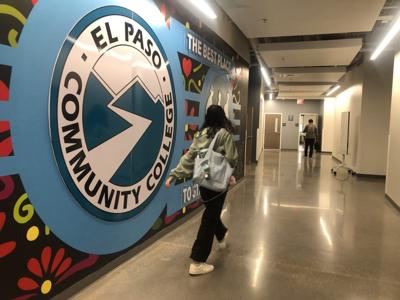
Top Takeaways
- In eight-week terms, two courses are a full course load, rather than four or five in semesters.
- Supporters say compressed terms attract and retain busy students juggling work and family.
- But there’s limited large-scale research on shorter terms and switching to a new calendar requires big campus-wide changes.
EL PASO, Texas — It was the eighth week of fall classes and there was no time to waste at the Mission del Paso campus of El Paso Community College. Psychology students zipped through a lesson that started with pre-scientific remedies and ended with modern-day cognitive behavioral therapy. American history students jotted rapid notes on post-Civil War Reconstruction. A U.S. government class surveyed decades of civil liberties case law in a packed 80-minute session.
At most college campuses, Week 8 means students are just around the midpoint of a more typical 14-to-18 week semester. But at Mission del Paso, students had made it to the end of the term.
Their campus is among a group of institutions across the country where compressed classes have become the norm. Some educators see the abbreviated calendar as a way to improve students’ chances of moving more quickly toward graduation. Supporters say the model — in which a full course load requires just two classes per term instead of the usual four — is especially appealing to students with work or family responsibilities on top of schoolwork.
Despite the accelerated pace, Mission del Paso students like Jose Rivera said they’re mostly feeling confident as they enter the homestretch of the so-called minimester. He and most students said they prefer the shorter format, seeing it as a means to beat procrastination or complete their degrees faster.
During the last week of the term, Rivera sat in the back row of a U.S. government lecture, his hand shooting up occasionally with questions. Rivera previously failed a 16-week U.S. government course, finding it a challenge to balance school with a part-time job. But in the eight-week format, he’s on track to earn an A+.
“I feel like I can manage my time more efficiently,” said Rivera, who hopes to work as a teacher’s assistant and then transfer to the University of Texas at El Paso. “Right after I get out of work — boom, school work is done.”
Colleges that have switched most or all classes to an eight-week cycle see much to like. At Mission del Paso, course completion rates rose 9 percentage points above the districtwide rate after converting most of its offerings to that schedule. Other colleges that favor shortened calendars around Texas say they’ve observed similarly positive results. The model can be good for business, encouraging formerly part-time students to enroll full time and increasing opportunities to register for classes.
“We’ve been at this work for 20 years, trying to move completion rates, compress time to degree, help students eliminate debt — all of those things,” said Karen A. Stout, the president and CEO of Achieving the Dream, a nonprofit that has supported community colleges experimenting with shortened academic terms. Overhauling the old calendar, she said, “is one big move that I think has the possibility to hit all of those metrics and get to equitable outcomes for students.”
At Mission Del Paso, the compressed model has attracted students like Mia Michelle Garcia, who hoped the shorter format would give her more time to work part time and care for a younger sibling. “I had to be at home a lot, so it was just kind of perfect,” she said, sitting on a balcony overlooking the school’s main lobby after class.
It hasn’t always been easy. Garcia quit her job when an essay-heavy English course and obligations at home became overwhelming. Two failed courses have delayed her path to earning an associate’s degree, a step toward a possible career as a psychologist. But Garcia, who is soon to graduate, thinks semesters would have been even more challenging.
“I like how here in the eight-week courses, they just teach whatever is really important,” she said. “Even the teachers tell us, ‘We don’t have a lot of time, so I’m just going to get into the meat and bones of the class.’ And that’s really what they do.”
One big move for colleges nationwide
There are potential drawbacks to eight-week terms. Until recently, little large-scale research tested its benefits. Students can easily overload on work, risking burnout. Some faculty are skeptical about whether the intensive format works for busy adults short on time for substantial online work outside of class. And the transition requires serious restructuring around campus, from designing new curriculum to scheduling course sequences.
Still, enthusiasm for compressed courses and terms has gathered steam as community college leaders around the country worked to increase enrollment after Covid-driven doldrums. Variations have taken off among a group of community colleges in Texas. Ivy Tech Community College in Indiana and Northeast Wisconsin Technical College are among those nationwide to launch eight-week schedules.
The default for California colleges and universities remains 15-to-18 week semesters or, less commonly, 10-week quarters. That means full-time students typically take four or five courses each term, completing an academic year over two semesters or three quarters, not counting summer terms. Colleges on eight-week terms nest two minimesters into a semester. Each eight-week class typically has the same course hours as its semester-length equivalent, and the tuition is the same per credit hour regardless of the calendar.
At the four-year level, California academic terms have been trending longer, not shorter. The California State University system, in recent years, has abandoned quarters for semesters, arguing quarters move too quickly for students. (Cal Poly San Luis Obispo will be the last CSU campus to switch in fall 2026.) At the University of California, all but two campuses use quarters, and now UC is contemplating a transition to semesters, too.
But a handful of community colleges around California already offer eight-week academic programs and more are set to start. Earlier this year, 22 California community colleges received philanthropic funding from the Ascendium Education Group to redesign and launch programs built around shortened courses in fall 2026. The same project will also gauge how students in compressed courses perform compared to traditional-length courses.
Evangelizing for eight weeks
Mission del Paso Dean Joshua Villalobos was converted to the idea of an eight-week term during a 2022 pilgrimage to Odessa College, a mecca for the compressed-term curious that hosts annual training sessions for leaders of other colleges.
Odessa’s internal data shows course success rates have since increased from 67% in 2010 — before it switched to eight-week terms — to 87% in 2024. Odessa has also enjoyed big enrollment gains since it started on an eight-week track in 2014. “It is the best decision that I think we’ve made with regards to student success on our campus,” said Kimberly McKay, the college’s vice president of student services and enrollment management.
Villalobos was initially skeptical, but resolved to give eight-week courses a try. “I definitely had my ulcers that first year,” he said. “It really was a huge gamble — an entire year of rebuilding the schedule, an entire year of getting faculty to buy in.”
To his great relief, enrollment increased. Fewer students dropped classes. In 2024, course pass rates across minimester pairs hit 81% or higher, up from 72% in 16-week courses the previous school year districtwide. “I sold my stock in Pepto,” Villalobos said.
A shift requiring ‘strength and flexibility’
When Villalobos arrived at Mission del Paso a few years after its 1998 opening, there was little but farmland and a freeway around the campus in east El Paso. But that soon changed.
Today, semitrucks plow past Mission del Paso along Interstate 10, where warehouse distribution centers have sprouted within an easy drive of the Mexican border. Students commute from subdivisions built beyond desert scrub. Of the five campuses that together enroll about 25,000 students in the El Paso Community College district, Mission del Paso is the only one to convert most classes to eight-week spurts.
On an overcast morning in mid-October, Villalobos and fellow Dean Jose Pacheco Lucero took an impromptu walking tour around the campus, the smell of creosote rising from the landscape under a light drizzle. They stopped at the tutoring center, where students were staving off final exam jitters with a visit for extra help.
The move to eight weeks has largely meant that students are encouraged to spend less time in classrooms, and more time working through asynchronous course materials online, attending one-on-one tutoring and visiting professors’ office hours.
The classroom experience has also changed, since cramming a 16-week syllabus into an eight-week chunk is hardly a winning strategy. “It really takes a lot of strength and flexibility to do it right,” Villalobos said.
‘I don’t feel burnt out’
For Mission del Paso psychology professor Nicholas A. Fernandez, the eight-week schedule has meant designing lectures with an urgent sense that every moment counts.
In mid-October, Fernandez jumped into the second-to-last lecture of the term with little preamble. He led a brisk review on the concept of psychological disorders, then split students into pairs to read short sections of their textbooks, discuss privately and summarize to the rest of the class. After some quick slides, the class watched a short video on exposure therapy and discussed personal experiences with mental health care. All in one hour and 20 minutes.
“In the 16-week semesters, I was sometimes dreading going to school because I’m tired,” Fernandez said in an interview. But when he’s teaching in bite-sized eight-week periods, he continued, “it’s so fast-paced that I don’t feel burnt out in the middle of the semester.”
‘A promising strategy’
New research adds to the evidence that eight-week terms could benefit students — and more work assessing the format is underway.
In what is likely the first large-scale study of condensed courses, UC Irvine researchers report that shortened academic terms in the Virginia Community College System had a positive impact on grades and completion rates. Their paper, published in August, also finds that students were more likely to pass additional courses in the same subject.
Previous research, though on a smaller scale, had mixed-to-positive results, with student opinions and performance divided on shorter schedules.
Open questions remain. Researchers with the Community College Research Center at Columbia University’s Teachers College are evaluating a four-year project expanding shortened terms across 16 colleges. It will run through 2029.
Studies so far suggest eight-week classes are “a promising strategy,” said Hoori Santikian Kalamkarian, one of the researchers, “but it depends on how it’s implemented.”











(0) comments
Welcome to the discussion.
Log In
Keep it Clean. Please avoid obscene, vulgar, lewd, racist or sexually-oriented language.
PLEASE TURN OFF YOUR CAPS LOCK.
Don't Threaten. Threats of harming another person will not be tolerated.
Be Truthful. Don't knowingly lie about anyone or anything.
Be Nice. No racism, sexism or any sort of -ism that is degrading to another person.
Be Proactive. Use the 'Report' link on each comment to let us know of abusive posts.
Share with Us. We'd love to hear eyewitness accounts, the history behind an article.